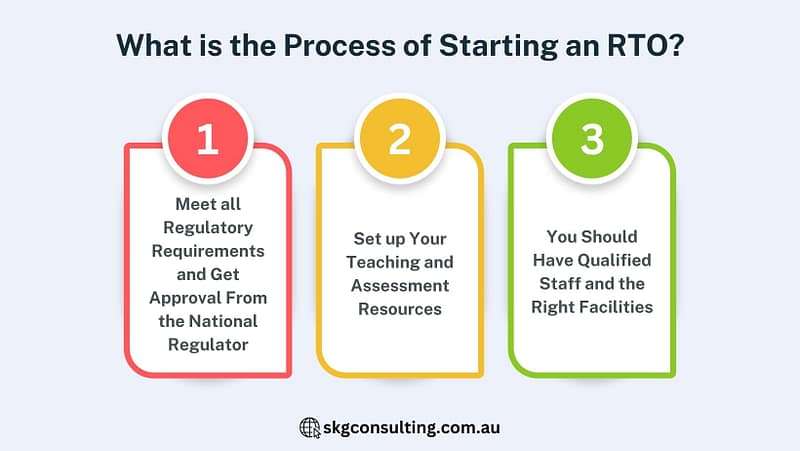How to Start an RTO

Starting a Registered Training Organisation (RTO) is a significant step in the education sector. This guide is designed for those looking to expand in the education industry, providing the necessary knowledge to set up your RTO efficiently.
What is an RTO?
A Registered Training Organisation (RTO) is an educational institution officially recognised by regulatory bodies. RTOs provide accredited training and qualifications to students.
RTOs deliver nationally recognised qualifications and courses across various industries and sectors, ranging from certificate to advanced diploma levels.
What are the Requirements for Starting an RTO?
To start a Registered Training Organisation (RTO), you must meet specific requirements, including developing a detailed business plan, obtaining the necessary educational qualifications, and ensuring compliance with national standards for vocational education and training.
The requirements for starting an RTO are mentioned below.
- Compliance with ASQA’s Eligibility Criteria: You need to follow ASQA’s rules and show you can provide good training and assessment that meet national standards.
- Financial Viability: You need to show proof of financial stability to keep running smoothly and to make sure your organization can pay its bills and run training programs well.
- Qualified Staff: Employ trainers and assessors with the qualifications, industry experience, and skills to deliver high-quality training and assessment aligned with vocational standards.
- Training and Assessment Resources: Hire trainers and assessors who have the right qualifications, experience in the field, and skills to offer training and assessment that match job standards
- Governance Structure: Set up a clear management system that defines who does what and how decisions are made to make sure the organisation is run well and responsibly.
- Facilities and Equipment: Maintain suitable facilities and equipment conducive to delivering the training and assessment services required for the qualifications offered.
- Compliance Management System: Implement systems and processes to monitor and ensure compliance with regulatory requirements, standards, and policies related to RTO operations.
- Student Support Services: Provide appropriate support services to assist students throughout their training journey, including guidance, counselling, and access to additional resources as needed.
- Quality Assurance Processes: Develop and implement quality assurance processes to monitor, evaluate, and improve the quality of training and assessment services delivered by the RTO.
- Continuous Improvement: Demonstrate a commitment to constant improvement by regularly reviewing and enhancing training programs, processes, and outcomes to better meet the needs of students and industry stakeholders.
- Legal and Ethical Obligations: Adhere to all relevant laws, regulations, and ethical standards governing RTO operations, including privacy, discrimination, and occupational health and safety.
- Registration Application: Prepare and submit a comprehensive application to the relevant regulatory authority, providing accurate and complete information about the RTO’s operations, resources, and compliance measures.
What is the Process of Starting an RTO?
The process of starting an RTO involves three main steps: first, meet all regulatory requirements and get approval from the national regulator; second, set up your teaching and assessment resources; and third, ensure you have qualified staff and the right facilities.
These steps are explained in detail below.
- Investigate ASQA’s Registration Requirements to Ensure Eligibility: Research and understand the specific requirements outlined by ASQA for RTO registration to ensure that your organisation meets all eligibility criteria.
- Conduct Thorough Market Research to Identify Target Audience and Needs: Gather data and insights to identify the target audience for your training programs and understand their needs, preferences, and challenges.
- Perform Competitor Analysis and Industry Consultation to Validate Business Concept: Analyse competitors in the market and consult with industry stakeholders to validate your business concept and identify opportunities for differentiation.
- Speak to Industry Professionals to Understand Market Pain Points and Opportunities: Engage with industry professionals to gain firsthand insights into market pain points, emerging trends, and opportunities for innovation within the sector.
- Consult with RTO Compliance Consultants for Expert Guidance and Insights: Seek guidance from RTO compliance consultants to ensure thorough understanding and compliance with regulatory requirements throughout the registration process.
- Investigate Training and Assessment Materials to Ensure Quality and Compliance: Evaluate training and assessment materials to ensure they meet quality standards and align with industry requirements and regulatory frameworks.
- Develop Tailored Marketing Strategies to Reach Desired Market Segments: Create targeted marketing strategies to effectively reach and engage with your identified market segments, communicating the value proposition of your training programs.
- Conduct Financial Planning to Ensure Viability and Sustainability: Develop a comprehensive financial plan to ensure the economic viability and sustainability of your RTO, considering factors such as initial investment, revenue streams, and ongoing expenses.
- Prepare a Comprehensive Business Plan Documenting Strategies and Goals: Develop a detailed business plan outlining your strategies, goals, target market, competitive analysis, marketing approach, and financial projections.
- Register Your Business Entity with Authorities: Complete the legal steps to register your business entity with relevant authorities, ensuring compliance with regulatory requirements for operating a business.
- Prepare Required Documentation for RTO Registration: Gather and prepare all required documentation for RTO registration, including financial viability assessments, self-assessment reports, and compliance declarations.
- Submit Application with ASQA Following Completion of Necessary Documentation and Preparation: Compile and submit your RTO registration application to ASQA, ensuring that all required documentation is complete and accurate according to the guidelines provided by the regulatory authority.
RTO Registration Services
SKG Consulting offers services for establishing a Registered Training Organisation (RTO) in Australia. Our tailored consulting services ensure efficient compliance with regulatory requirements and facilitate the seamless setup of your RTO.
Contact us at +61 409 983 643 for RTO registration services in Australia. We’re here to assist you every step of the way.
FAQs
What happens when an RTO application is accepted?
Once the AQSA accepts an RTO application, it signifies your organisation’s capacity to deliver high-quality training and allows it to offer nationally recognised qualifications. The timeframe for approval varies but typically takes 2-6 months.
What if an RTO application gets Rejected?
If an RTO application is rejected, the applicant should review feedback, rectify deficiencies, seek expert guidance, resubmit the application, maintain communication with the authority, consider appeals if applicable, and stay updated on regulatory changes.
What are the financial requirements for starting RTO?
Demonstrate financial viability by showing enough funds for setup, ongoing costs, and emergencies. Provide financial statements, cash flow projections, and evidence of funding sources.
Who can be a Trainer and Assessor?
Trainers and assessors in an RTO need relevant qualifications, industry experience, and vocational competencies demonstrated through formal qualifications, workplace experience, and professional development, including the appropriate VET qualifications.
How long does it take for RTO application approval?
The timeline for RTO registration varies based on application completeness, responsiveness, and regulatory workload, generally spanning from two to six months on average.
What records must an RTO maintain?
RTOs must maintain detailed records, including student enrollment, assessment outcomes, qualification issuance, trainer qualifications, finances, and governance documentation, to ensure compliance and quality assurance. These records are crucial for audits and ongoing regulatory compliance.
What is the cost of starting an RTO?
Starting an RTO cost can vary depending on scale, training type, and compliance needs. Expenses include application fees, consultant fees, salaries, resources, facilities, and ongoing operational costs. Careful budgeting and consideration of all payments are essential.
How do I renew my RTO registration?
To renew RTO registration, submit updated documentation demonstrating ongoing compliance before the current registration expires. This includes evidence of financial viability, qualified staff, resources, and quality assurance processes.

